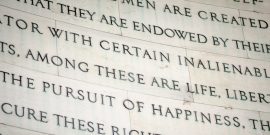The Distinction Between Constitutional Law and Constitutive Traditions
Last week, I had the pleasure of participating in the Tradition Project run by Mark Movsesian and Marc DeGirolami of St. John’s Law School. The subject of this year’s conference was tradition in law and politics. One of the high points for me was the opportunity to read Harry Jaffa. He turned out to be a very interesting thinker. But I found that his famous claim that the Declaration of Independence has a constitutional status weakly defended. In particular, he fails to distinguish between positive constitutional law and constitutive traditions—a distinction that I think central to political life in a constitutional republic.
The Declaration of Independence is not positive law. It is instead a declaration of the reasons that the colonies were breaking with Great Britain. Courts do not enforce it as law. While other officials reference the Declaration on occasion, they do not generally do so in a way that suggests that it represents a binding legal obligation. It would be hard to make it so, because while the Declaration announces general truths of politics, it does not impose specific legal norms. And, unlike the Constitution, it was not ratified by the people and is not the product of a process that Mike Rappaport and I have described elsewhere as conducive to good constitutions.
While it does not create positive law, the Declaration of Independence is an important source—the most importance source— of our constitutive traditions. As such politicians and citizens regularly invoke it in debates about fundamental political decisions, including those to change the Constitution. Thus, for instance, it was wholly appropriate to invoke the Declaration when deciding whether to require territories admitted as states to forbid slavery or whether to pass a constitutional amendment requiring states to provide equal rights to a certain class of citizens. Of course other considerations, including prudential ones, also may be relevant to such decisions. Moreover, the specific contours of the rather vague principle of equality referenced in the Declaration are the subject of legitimate political debate. Mike Rappaport and I have argued that constitutional rights are generally not vague.
Sadly, the failure to distinguish between positive constitutional law and constitutive traditions is a problem common to the Left and some precincts of the libertarian Right. Limiting the judicial enforcement of positive law to the specific provisions of the Constitution empowers a constitutional politics driven in no small measure by our constitutive traditions. Citizens can use our constitutive traditions to remake our constitutions, both state and federal. They can also deploy those traditions to create new statutory provisions that, while not formally entrenched, are unlikely to ever be repealed. We must never forget that it is constitutive traditions that can guide the development of the Constitution.
